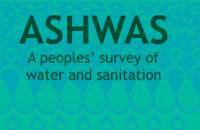Sanitation and Hygiene
Drinking water from a fresh pit everyday - The life of people in the fishing settlements in Dhanuskodi
Posted on 12 Nov, 2009 11:59 PMIn an earlier post Microfinance for Water - How would it Work? I had put up a picture of a woman drawing water out from a pit.
BushProof Water & Sanitation for Development & Emergencies, World Toilet College, Singapore
Posted on 09 Nov, 2009 10:55 AMBushProof Water & Sanitation for Development & Emergencies training
Location: Singapore
ASHWAS - A people's survey of water and sanitation in Karnataka (2009)
Posted on 05 Nov, 2009 04:17 PM
This report includes the findings of the ASHWAS survey (A Survey of Household Water and Sanitation), a participatory survey carried out by Arghyam, that included 28 districts of Karnataka covering more than 17,200 households across 172 gram panchayats (GPs). This was a peoples' survey, and the surveyors were selected from the respective communities that included students, women from self help groups, local NGO partners and other volunteers.
Terre des hommes Foundation (Tdh) needs a WASH Project Engineer
Posted on 30 Oct, 2009 10:03 AMLocation: Port Blair and Baratang on Andaman & Nicobar Islands, on field presence in Baratang at least 20 days
Duration of assignment: 30 months, starting not later than 1st December 2009
Full Job description available under: http://216.119.85.221/artman2/publish/indian-jobs/article_17239.shtml
Deadline for applications: 6th of November 2009
Sustainable and Ecological Sanitation - Experiences
Posted on 24 Oct, 2009 11:13 PMA consultation was organised by Arghyam Trust in September 2009, to share experiences on Sustainable and Ecological Sanitation with the Planning Commission.
Consultation on sustainable sanitation at Arghyam Trust Bangalore (9th Sept 2009)
Posted on 21 Oct, 2009 12:01 PMA consultation was organised by Arghyam Trust on 9th September 2009 at Bangalore, to share civil society experiences regarding sustainable sanitation with the Planning Commission. The Planning Commission was represented at the event by Dr. Mihir Shah. The focus of the consultation was largely on rural sanitation.
Book review: "The Big Necessity"
Posted on 19 Oct, 2009 08:23 AM
The Big Necessity - The unmentionable world of human waste and why it matters By Rose George
An update on ecosan work in India
Posted on 19 Oct, 2009 01:55 AMPrakash Kumar, an ecological sanitation consultant with UNICEF/Stockholm Institute provides an update on some recent work on ecological sanitation in India:
====
- We are in the process of supporting I I T Delhi for nutrient recovery project for developing complete process for converting liquid urine in to the crystalline form.
- We are in the final stage of supporting SCOPE for demonstration of ecosan toilet in a govt. middle school at Musiri, Trichy.
- Comprehensive evaluation of Tamilnadu ecosan project will be taken up shortly.
- Last batch of training of CCDU officials have been completed . This year total 5 batches got training on ecosan.
Global Handwashing Day for 2009
Posted on 16 Oct, 2009 12:53 PM


WSSCC Member Flash
Periodic updates for WSSCC members on hot and late-breaking topics
Global Handwashing Day Special Edition
The practice of handwashing with soap has been prominent in the last few years on the international hygiene agenda. The second annual Global Handwashing Day takes place on Thursday, 15 October 2009 in countries all over the world, including countries where WSSCC is active through its National WASH Coalitions. The guiding vision of Global Handwashing Day is a local and global culture of handwashing with soap. Although people around the world wash their hands with water, very few wash their hands with soap at critical moments (for example, after using the toilet, while cleaning a child, and before handling food).
Sanitation in the flood affected areas - Biome Solutions
Posted on 15 Oct, 2009 02:16 PMBiome Solutions, a Bangalore-based company working on sustainable architecture and buildings visited some flood affected areas in Guntur to observe the situation and see the suitability of applying "Ecological Sanitation", a new approach to sanitation. (Search on India Water Portal for "Ecological sanitation" for more information on this). Their report after their travels can be seen below.
A point of interest is the picture of a flooded toilet. Pit toilets which are the norm in rural areas have the disadvantage that during floods the pit below the toilet (where the human waste accumulates over time) gets flooded and the toilet becomes unusable. The faecal matter can come out of the toilet pan and create a real mess which needs to be cleaned up.
Read their report at:
http://biomesolutions.blogspot.com/2009/10/visit-to-flood-affected-areas-in-guntur.html





